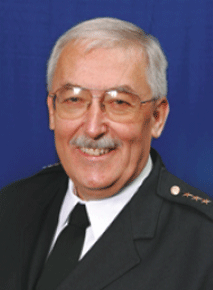
As we are all well aware, recent events have once again renewed focus on the relationship between police agencies and minority communities. Unfortunately, highly publicized national and local incidents serve to foster the perception that unfair/unethical actions by law enforcement are both widespread and systemic. Although not accurate, this perception is extremely damaging to our crime reduction efforts. Without community support, law enforcement agencies cannot succeed.
The root causes of tension between police officers and the communities they serve are as understandable as they are historic. Law enforcement officers occupy a unique position in a free society. They patrol the narrow line that separates freedom from lawlessness and even the most basic enforcement action taken by police officers can appear to infringe on the rights of others. The very nature of their duties ensures that law enforcement officers will be placed in the center of situations that are typified by stress and hostility. As a result, law enforcement officers are often the focal point for rage and confusion. If you add to this already volatile combination the perception that the officers may be acting in an unfair or inequitable fashion, it becomes clear why some members of the community view law enforcement officers with suspicion and contempt instead of with trust and respect.
We have made remarkable strides in policing in recent years. As a nation, we have dramatically increased the strength of our numbers; done a better job of training and preparing the men and women in police service for the work they do; and, we’ve provided police officers today with more and better tools to do their jobs than perhaps ever before. The result is that crime has decreased dramatically; people really are safer than they’ve been in years; and, because of the effective work of police departments, our citizens thrive today in areas where they abandoned hope not so long ago.
As a profession, we are not willing to accept any substandard law enforcement practices. That is why the IACP has always been so strongly committed to promoting and enhancing the ethical conduct of police officers. Through the use of the Law Enforcement Code of Ethics and the IACP’s Law Enforcement Oath of Honor we have demonstrated our unwavering commitment to professional policing standards. Nonetheless, the troubling reality that the people of the United States must confront is that we are entering a time when there is an increasing concern in many areas that the once strong police-community relationship is in jeopardy.
That is why over the years the IACP has aggressively sought to address this critical issue. Since the first IACP Forum on professional traffic stops in 1998, no year has passed without a resolution, model policy release, publication, or forum to further promote and reinforce this commitment. More than 25 actions and publications highlight the IACP’s efforts in this area including the following:
- Reports of the Professional Traffic Stops Forums I & II
- A Symbol of Fairness and Neutrality: Policing Diverse Communities in the 21st Century
- Police Chiefs Guide to Immigration Issues
- Protecting Civil Rights: A Leadership Guide for State, Local, and Tribal Law Enforcement
- IACP Model Policies and Training Keys
- Numerous articles from the Police Chief that detail agencies’ initiatives/best practices that address these issues
In addition, at our upcoming annual conference in Denver, we will be holding a special plenary session on “Race and the Police: In Search of Perspective.” This plenary session will feature a panel of IACP leaders and special guests to discuss, conversationally, the realities and implications of today’s police-race dynamics. Among the topics to be addressed are the selection, orientation, and training of officers who police minority areas; the reality of minorities’ perceptions of police; the systemic or non-systemic nature of profiling; the poorly illuminated structure of disproportionate police-minority contact; the reality of disparate confinement; and the issue of illegal immigrants and crime.
This plenary session will serve as a prelude to preparation of an IACP Policy Brief designed to provide members and the public with a more complete and accurate representation of race-police issues and “where we are” in our collective effort to protect our communities and to serve all citizens justly. This brief will set forth our progress and successes and the issues and the barriers that remain.
Finally, the renewed focus on police-community relations once again emphasizes the need for the establishment of a National Commission on Law Enforcement and the Administration of Justice that the IACP has advocated for more than 20 years. This commission, modeled after the 1965 Presidential Commission, would be empowered to conduct a comprehensive review of law enforcement and the administration of justice in the United States and to provide the nation with a measured response to crime.
It is imperative that we, as police leaders, do everything in our power to remove the doubt and improve the confidence in our agencies and our officers. We know that despite our daily efforts establishing and maintaining a safe community is difficult at the best of times. When the bond of trust between a police agency and its community is strained, the task becomes almost impossible.
We must continue our efforts to move past the difficulties and recriminations of the past and work together to forge stronger and safer communities. ■


